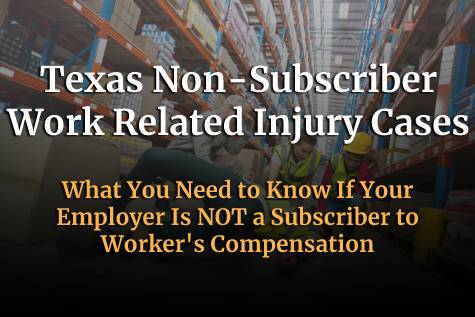Texas is one of the few states in the nation that does not require employers to provide workers’ compensation insurance to employees. However, if an employer subscribes to a State-approved workers’ compensation plan, an employee is generally barred from suing his or her employer for an on-the-job injury even if the employer was negligent. Instead, the injured employee’s exclusive remedy is through the workers’ compensation plan.
How can I tell if my employer carries worker’s compensation insurance?
Sometimes, employees are unaware that their employers do not carry workers’ compensation insurance. Under Texas law, employers are required to post information about their workers’ compensation insurance in an open and frequently-visited area in the workplace to which all employees have access such as a kitchen or break room.
If the employer subscribes to a state-approved workers’ compensation plan, the posted notice should include the name, address, and contact information of the insurance carrier. If the employer does not carry workers’ compensation insurance, there should be a notice posted in an easily-accessible area that provides the type of benefits plan in force and the contact information of the insurance carrier.
What if my employer does not subscribe to worker’s compensation?
Although many Texas companies choose to subscribe to workers’ compensation plans as a way of avoiding the high costs of defending work injury lawsuits, there are a large number of employers who choose not to subscribe to this type of insurance. Oftentimes, these “non-subscribers” are self-insured.
Others will carry other forms of insurance that cover employee injuries, such as an employee benefits plan. These plans, however, often provide far less protections and benefits to injured workers than a state-approved workers’ compensation plans and often do not provide wage replacements, such as indemnity benefits under a worker’s compensation plan.

Alternative benefit plans are typically under the control of the employer, who can require the injured employee to see specific pre-approved doctors, give recorded statements to investigators, and waive their rights to seek additional benefits after receiving treatment. Moreover, non-subscribing employers are under no obligation to pay for a worker’s lost wages.
Although a company may choose to pay injured workers a portion of their regular income, such payments can be terminated by the employer at any time. If the injured employee is fortunate enough to be receiving compensation from a non-subscribing employer, it may be inadequate to cover the employee’s living expenses. For these reasons, Texas employees should always discuss non-subscriber claims with an attorney before accepting a non-subscribing employer’s benefits.
Injured workers who are employed by non-subscribers may follow the procedures required under the employer’s alternative benefit plan, file a non-subscriber work injury claim with the employer or in a lawsuit, or both.
If you were injured or hurt at work, Armstrong Lee & Baker LLP can help review your case. With a 4.9-star Google review from 70 of their clients, they are known to provide high-value, professional representation for every single client. Contact us online or call us for a free consultation.
What if I am not happy with my employer’s alternative benefit plan?
There are certain benefits to asserting a non-subscriber claim. Because employers owe their employees a duty to provide a safe workplace, an injured employee may receive damages associated with the workplace injury, including past and future medical expenses, lost wages and lost earning capacity, physical impairment, and disfigurement caused by the accident.
In addition, employees may be able to recover damages for their pain and suffering and mental anguish, which are not available to employees covered under the state-sponsored workers’ compensation program.
What do I need to prove to win a non-subscriber case?
In order to prevail in a non-subscriber case, the injured employee must show that his or her employer was negligent by failing to provide a safe workplace. If an employee can show that the non-subscribing employer’s negligent conduct was a contributing factor in causing the injury, then the employer is responsible for compensating the employee for the damages for which it is legally responsible.
Non-subscribing employers have been held responsible for work-related injuries under a variety of negligence theories, including providing an unsafe working environment, failing to properly train or supervise its employees, failing to provide employees with necessary safety equipment or instrumentalities, failing to provide necessary assistance to its employees, failing to fix known safety issues, failing to warn employees of known dangers, and other negligent practices.
Can a non-subscriber blame me for my injuries?
Although it may seem unfair that Texas employers are not required to subscribe to the state-sponsored workers’ compensation program, there is an upside: As a matter of law, non-subscribing employers may not assert that the injured employee caused or contributed to his or her own injuries, unless the employee was the sole cause of the injuries. What this means is that non-subscribing employers are legally prohibited from arguing that the employee was injured because of his or her own negligence.
Generally, the only way an employee can share legal responsibility for an on-the-job accident is if he or she was intoxicated, or if the employee intentionally brought about their own injury. If neither of those conditions apply to your case, then it is likely that the injured employee will be in a strong position for trial.
Contact a Non-Subscriber Workers Compensation Lawyer
The amount of money that an injured employee can receive from his or her employer depends on the circumstances of the case, the extent of the injuries, and the ability to earn a living in the future. If your employer is not providing the assistance and support you need after a work injury, you need an advocate that will fight for the compensation you deserve. Contact Armstrong Lee & Baker LLP today for your free and confidential consultation.
